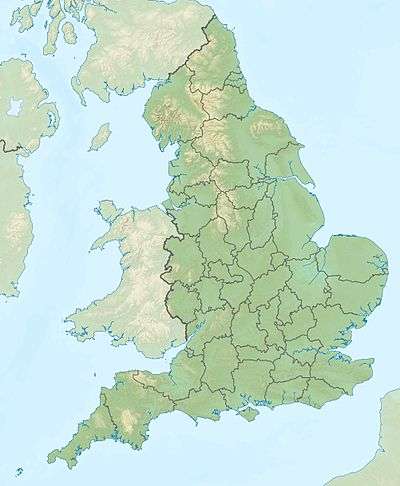1931 Dogger Bank earthquake
The Dogger Bank earthquake of 1931 was the strongest earthquake recorded in the United Kingdom since measurements began. It had a magnitude of 6.1 on the Richter magnitude scale, and it caused a shaking intensity of VI (strong) to VII (very strong) on the Mercalli intensity scale.[1][2] The location of the earthquake in the North Sea meant that damage was significantly less than it would have been had the epicentre been on the British mainland.
 | |
| UTC time | 1931-06-07 00:25:13 |
|---|---|
| ISC event | 906812 |
| USGS-ANSS | n/a |
| Local date | 7 June 1931 |
| Local time | 01:30 |
| Magnitude | 6.1 ML |
| Epicentre | 54.08°N 1.50°E |
| Areas affected | United Kingdom, Belgium, France, Norway, Germany |
| Tsunami | Yes |
| Casualties | 2 (indirect) |
Earthquake
The tremor began at around 1:30 am on 7 June 1931 with its epicentre located at the Dogger Bank, 60 miles (97 km) off the Yorkshire coast in the North Sea. The effects were felt throughout Great Britain as well as in Belgium and France.[3] The earthquake resulted in damage at locations throughout eastern England. The coastal town of Filey in Yorkshire was worst hit, with the spire of a church being twisted by the tremor. Chimneys collapsed in Hull, Beverley and Bridlington, and Flamborough Head suffered crumbling of parts of its cliffs. It was also reported that a Hull woman died as a result of a heart attack caused by the quake. In London the head of the waxwork of Dr Crippen at Madame Tussauds fell off.[4][5]
Tsunami
A small nondestructive tsunami wave was reported to have hit the east coast of England and other countries around the North Sea.[6]
References
- "Historical Earthquakes Listing". British Geological Survey. Archived from the original on 13 June 2007. Retrieved 11 May 2007.
- British Geological Survey. "UK Historical Earthquake Database". Retrieved 15 March 2018.
- "All Britain Shaken by an Earthquake". The Northern Echo. 8 June 1931. p. 1.
- Hough, Andrew (10 September 2010). "Police given earthquake training for 'extremely unlikely crisis'". The Telegraph.
- Davies, Carey (29 November 2012). "Earthquake hits the Lake District". TGO Magazine. Archived from the original on 5 May 2013. Retrieved 30 November 2012.
- Naturalsciences.be: A tsunami in Belgium? (26 July 2013, archived at Internet Archive 25 April 2014)
Further reading
- Versey, H. C. (1939). "The North Sea Earthquake of 1931 June 7". Geophysical Journal International. Wiley. 4 (6): 416–423. Bibcode:1939GeoJ....4..416H. doi:10.1111/j.1365-246X.1939.tb02906.x.
External links
- Contemporary newspaper report (archived at the Wayback Machine)
- Dogger Bank Earthquake, British Geological Survey
- Earthquake records
- The International Seismological Centre has a bibliography and/or authoritative data for this event.